
Essential Steps for Dog Ruptured Anal Gland Treatment
Overview
Have you ever worried about your dog's health? Understanding the signs of a ruptured anal gland can be crucial for your furry friend’s well-being. The essential steps for treating a dog with this condition include recognising symptoms, seeking prompt veterinary care, and implementing appropriate treatment options.
Early detection is key. Look out for signs like scooting or excessive licking. These behaviours can indicate discomfort and should not be ignored. Moreover, timely intervention can greatly improve your dog's recovery and comfort.
Treatment methods may include:
- Manual expression
- Antibiotics
- Possibly surgery
Each option plays a vital role in ensuring your pet returns to a state of happiness and health. In addition, knowing that you can take action when you notice these symptoms can provide peace of mind.
Remember, your dog's comfort is paramount. If you observe any concerning behaviours, don’t hesitate to reach out to your veterinarian. Taking these steps not only helps your pet but also strengthens the bond you share.
Introduction
As a devoted pet owner, have you ever worried about your dog's health? Understanding the intricate functions of a dog's anal glands is essential for ensuring their well-being. These small yet vital structures play a significant role in your dog's health, aiding in digestion and territorial marking.
However, when these glands become impacted or rupture, it can lead to discomfort and severe health complications. Recognising the warning signs is crucial. How can you ensure your furry friend receives the necessary treatment? This guide delves into the critical steps for addressing ruptured anal glands, exploring symptoms, treatment options, and preventive measures to safeguard your dog's health.
Moreover, being informed empowers you as a pet owner to take proactive steps. Together, we can navigate this important aspect of your dog's health, ensuring they remain happy and healthy.
Understand Dog Anal Glands and Their Functions
Have you ever worried about your dog's health? Dog anal sacs, or anal pouches, are two small structures located on either side of the anus, playing a crucial role in your canine's well-being. They produce a strong-smelling fluid that serves multiple purposes: lubricating the stool during defecation and marking territory through scent.
Usually, when a dog defecates, the pressure from the stool naturally activates these organs. However, if they fail to empty properly, the need for dog ruptured anal gland treatment may arise to prevent them from becoming impacted or infected, leading to various health issues. Glandular sac disease is quite common, affecting around 15.7% of dogs, with glandular sac impaction being the most frequent condition at 8.9%. This highlights the importance of understanding these structures to identify potential issues promptly.
Moreover, veterinarians stress that consistent observation and awareness of your dog's rear health can prevent complications. For instance, conditions like sacculitis can cause significant discomfort and may require timely dog ruptured anal gland treatment. By being attentive to your dog's rear health, you can help ensure their overall well-being.
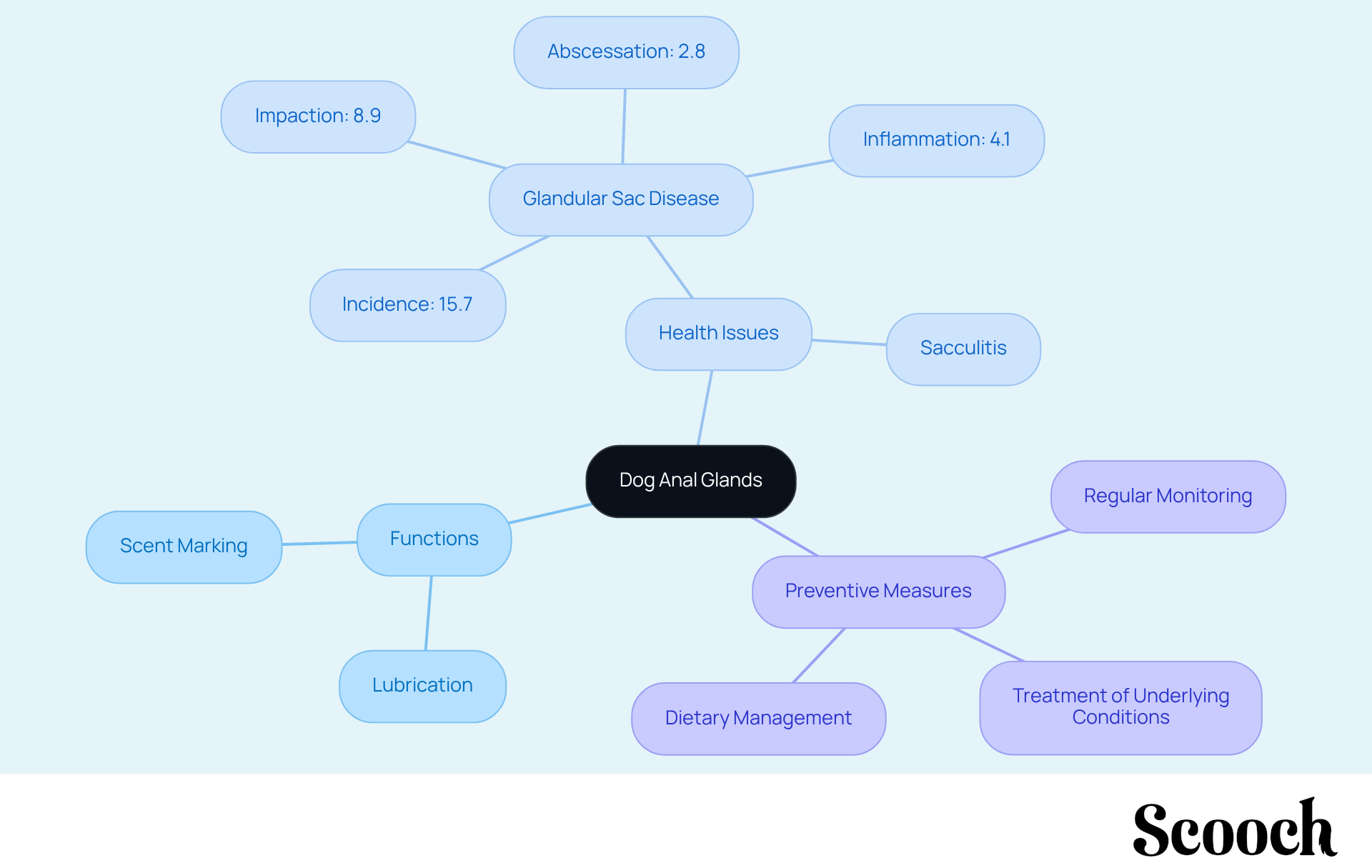
Identify Symptoms of a Ruptured Anal Gland
Recognising the signs that may require dog ruptured anal gland treatment is crucial for prompt action, and as a caring dog owner, you may find yourself worried about your furry friend’s health. Have you ever noticed your dog displaying unusual behaviours? Key indicators to watch for include:
- Scooting: Dogs often drag their bottoms along the ground to alleviate discomfort caused by anal gland issues. This behaviour is common and can signal underlying problems.
- Excessive licking: Frequent licking of the rear area may indicate irritation or pain, prompting your dog to seek relief.
- Swelling or redness: Inflammation around the anus is a critical sign to watch for, as it can suggest an infection or abscess.
- Discharge: The presence of pus or blood from the rectal area is a serious symptom that requires immediate veterinary attention.
- Discomfort during defecation: If your dog seems troubled or uneasy while attempting to poop, it may be experiencing pain associated with rectal problems.
- Foul smell: A strong, fishy odour can be linked to rectal issues, indicating a possible infection.
- Low energy: A noticeable decrease in your dog's energy levels may also indicate discomfort or pain associated with sac issues.
Recognising these symptoms early can prevent further complications, such as abscess formation or infection. If you observe any of these signs, especially those indicating a need for dog ruptured anal gland treatment, it is crucial to consult a veterinarian without delay. As Dr. James Bascharon notes, "If an abscess is left untreated, it can rupture, and your dog will be in severe to extreme pain." Your dog deserves the best care, and acting promptly can make all the difference.
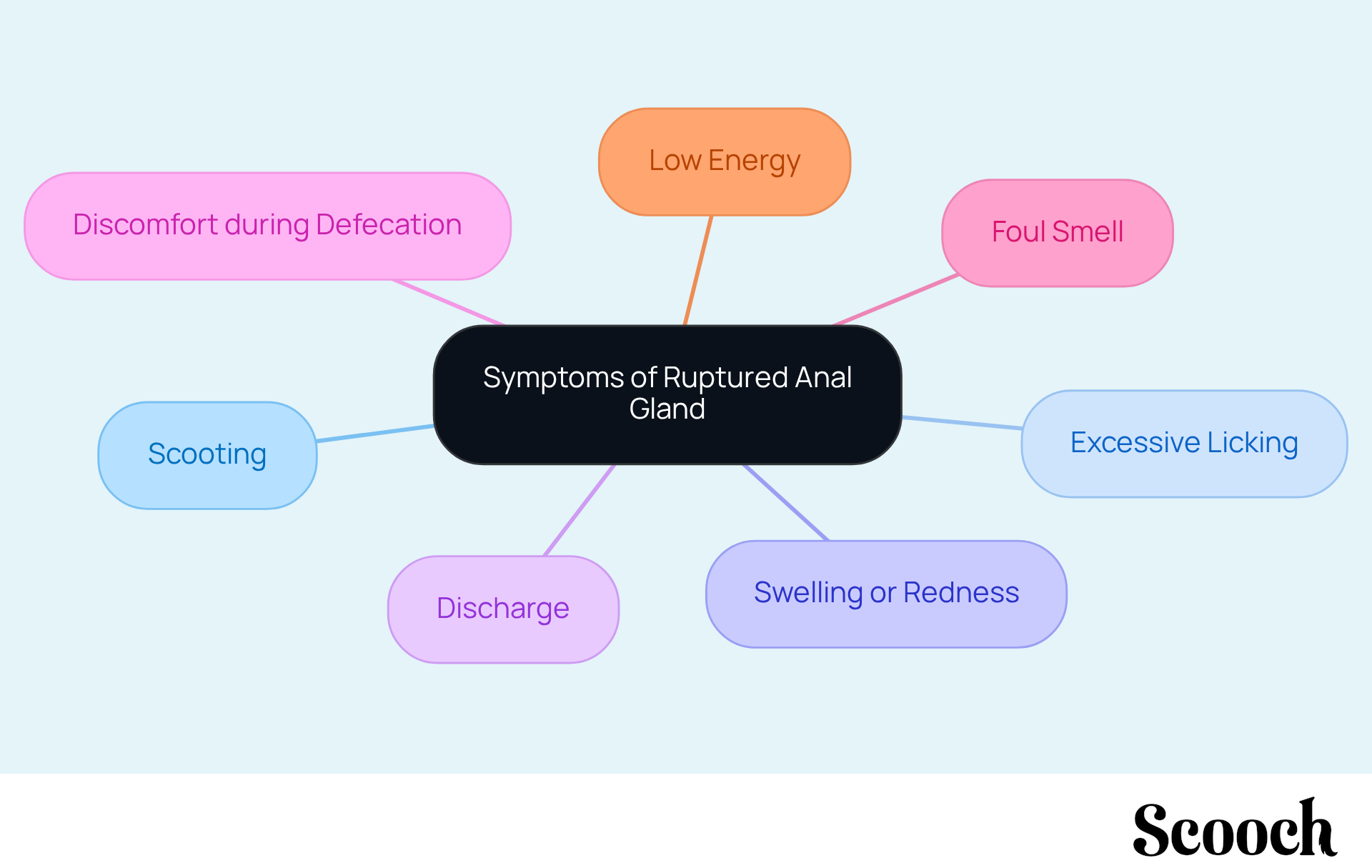
Seek Veterinary Care Immediately
If you believe that your dog has a ruptured secretion pouch, obtaining veterinary assistance promptly for dog ruptured anal gland treatment is essential. Have you ever worried about your dog's health? Prompt attention can significantly enhance your dog's comfort and recovery after dog ruptured anal gland treatment. During the veterinary appointment, the veterinary surgeon will conduct a thorough assessment to determine the state of the sac and choose the most suitable course of action.
Treatment options may include:
- Pain management: Your veterinary surgeon may prescribe pain relief medications to help alleviate discomfort associated with the rupture.
- Antibiotics: If an infection is present, antibiotics will be essential to address it effectively.
- Surgical intervention: In more severe cases, surgery might be necessary to repair the rupture or remove the affected organ.
Moreover, veterinary surgeons stress that prompt action is crucial; as one specialist pointed out, 'Timely care can significantly enhance results for dogs requiring dog ruptured anal gland treatment.' Delaying dog ruptured anal gland treatment can lead to complications, making it vital to act swiftly. Regular cheque-ups and monitoring for signs of discomfort, such as scooting or excessive licking, can help catch these issues early, ensuring your pet receives the care they need without unnecessary suffering.
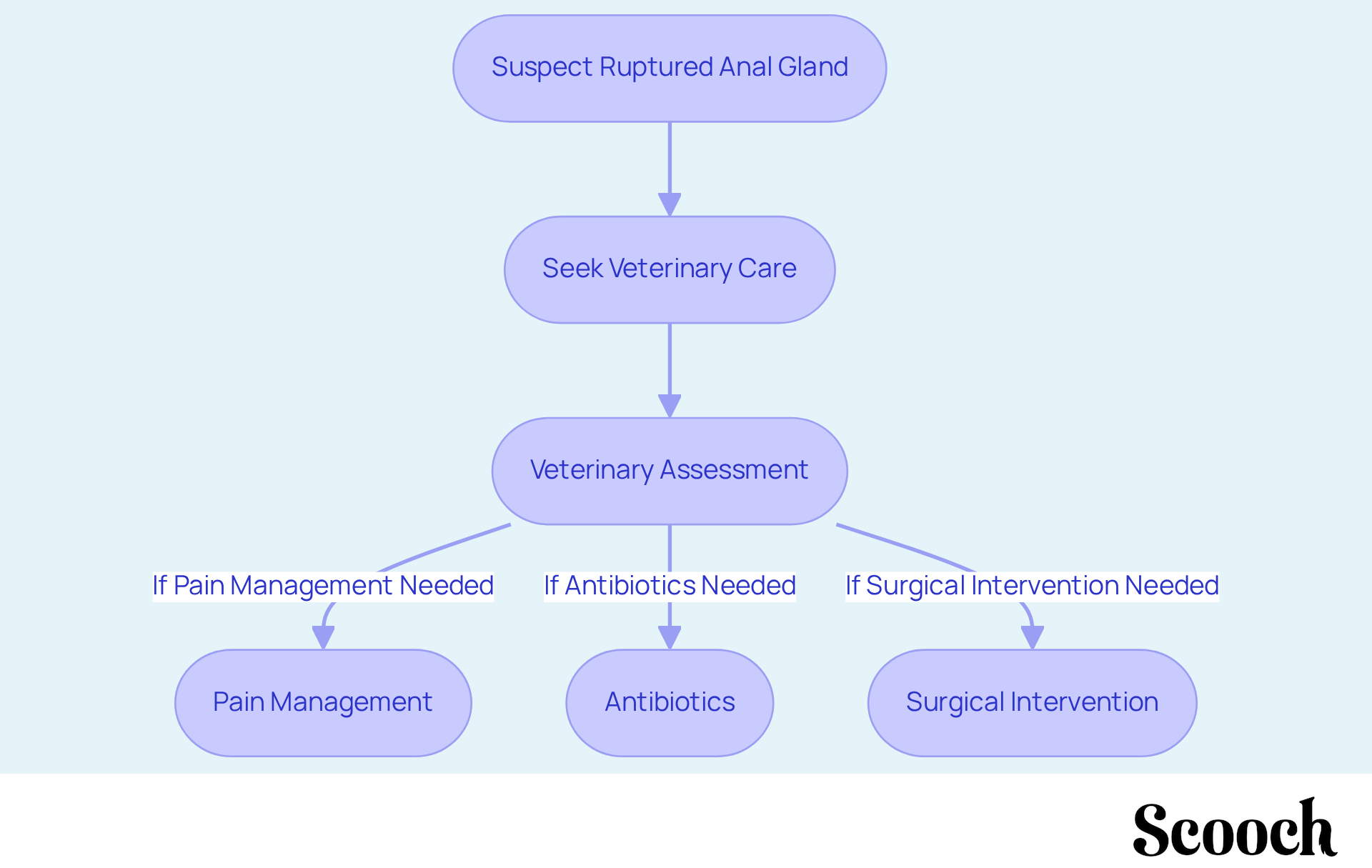
Explore Treatment Options for Ruptured Anal Glands
Caring for a dog during the dog ruptured anal gland treatment can be a daunting experience for dog owners. Have you ever worried about your dog's health? Understanding the seriousness of the condition is essential, and a comprehensive strategy for dog ruptured anal gland treatment tailored to your dog's needs is crucial.
-
Manual Expression: One effective solution is manual expression of the secretory sacs. Veterinarians can perform this procedure to relieve pressure and remove impacted material, especially when done early. Many dogs benefit from regular dog ruptured anal gland treatment, which promotes glandular health and helps prevent future issues.
-
Antibiotics and Anti-inflammatories: In addition, veterinarians often prescribe antibiotics and anti-inflammatory medications to combat potential infections and reduce swelling. These treatments are vital for managing pain and supporting recovery, particularly in cases requiring dog ruptured anal gland treatment. Most rectal sac abscesses heal within a week with prompt veterinary care, underscoring the importance of seeking help quickly.
-
Surgical Options: For more severe cases, surgical intervention may be necessary to repair or remove the ruptured organ. While surgery can significantly improve a dog's quality of life by alleviating persistent sac problems, it does carry risks, including infection. Careful post-operative management and follow-up visits are essential to ensure proper healing.
Real-life examples highlight the effectiveness of these treatments. For instance, Chester, a dog who followed a treatment plan involving pain management, antibiotics, and routine expressions, experienced a successful recovery. In situations where manual expression falls short, surgical options have shown impressive success rates in resolving recurring rectal pouch issues.
Overall, prompt veterinary assistance is key to the dog ruptured anal gland treatment. Pet owners should remain vigilant for signs such as scooting, licking, or unpleasant odours, which may indicate underlying problems. Furthermore, dietary changes, like adding fibre to your dog's meals, can assist in preventing gland-related issues. Remember, you are not alone in this journey—seeking help and being proactive can make a significant difference in your pet's health.
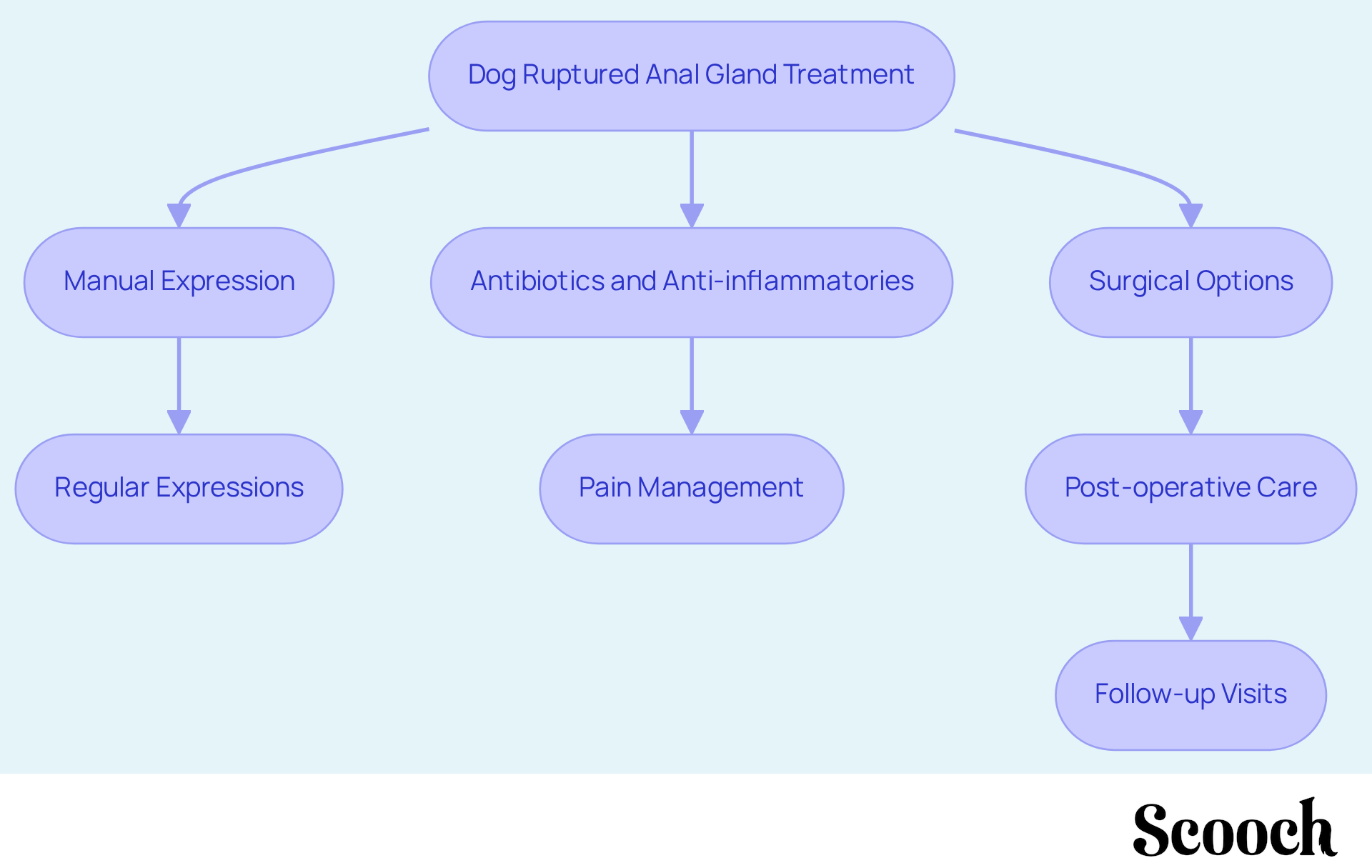
Implement Preventive Strategies for Anal Gland Health
Have you ever worried about your dog's health? To effectively prevent anal gland issues in your furry friend, consider implementing the following compassionate strategies:
-
High-fibre diet: A diet rich in fibre is essential for promoting regular bowel movements, which naturally express the anal glands. Premium dog foods that emphasise whole grains and vegetables can greatly enhance rear health. Research indicates that a high-fibre diet can reduce the occurrence of sac disease, as it helps create firm, bulky stools that facilitate natural expression during defecation.
-
Regular exercise: Keeping your dog active is crucial for maintaining healthy digestion and promoting regular bowel movements. Moreover, consistent physical exercise not only aids in weight management—an important aspect as overweight dogs are more susceptible to rectal issues—but also promotes overall digestive health, lowering the chances of impaction and infection.
-
Routine veterinary cheque-ups: Regular visits to the veterinarian are essential for monitoring your dog's gland health. These cheque-ups allow for early detection of potential issues, enabling timely intervention. Most glandular sac diseases can be effectively managed with manual expression and appropriate treatments, such as dog ruptured anal gland treatment, when identified early.
-
Hydration: Ensure your dog has constant access to fresh water. Adequate hydration is essential for overall well-being and assists in digestion, which can positively influence the function of the related organs. Dehydration can result in firmer stools, making it more challenging for the natural expression of rectal sacs.
Veterinarians stress that keeping a healthy weight and adding fibre supplements can additionally aid in the health of the sacs. As one veterinarian observed, "Maintaining your dog at a proper weight can also assist in promoting good health in that region." By being proactive and attentive to these aspects of your dog's care, you can significantly reduce the likelihood of requiring dog ruptured anal gland treatment. Remember, your love and care make a world of difference in your dog's health.
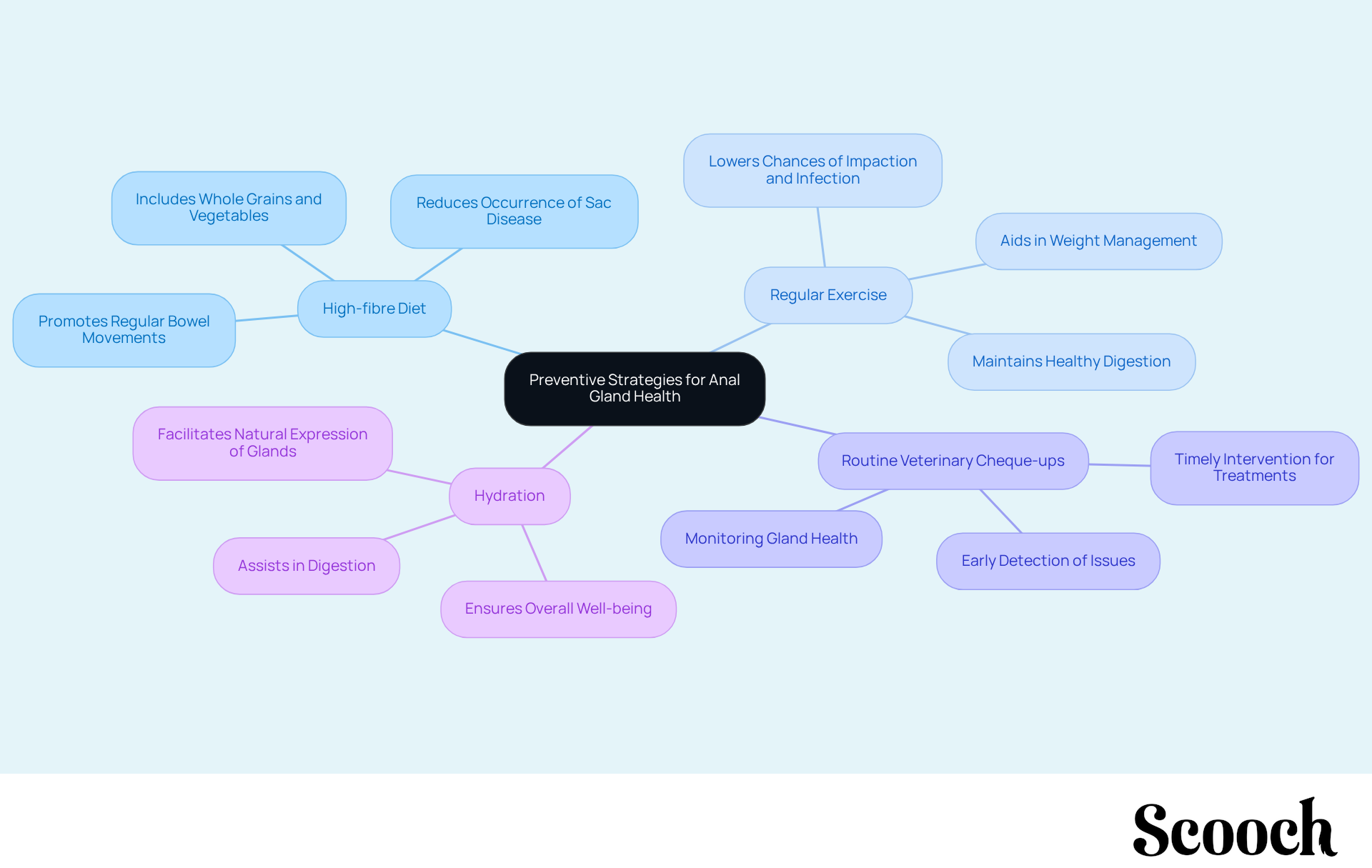
Conclusion
Understanding the complexities of dog anal glands and the importance of their health is vital for any dog owner. Have you ever worried about your dog's health? Recognising symptoms of a ruptured anal gland and seeking prompt veterinary care are essential steps in ensuring the well-being of your canine companion. By being proactive, you can significantly enhance your pet's comfort and recovery, ultimately leading to a healthier life for your furry friend.
Key insights discussed include various symptoms that indicate potential anal gland issues, such as:
- Scooting
- Excessive licking
- Foul odours
Moreover, the importance of timely veterinary intervention cannot be overstated. This can range from manual expression to surgical options, depending on the severity of the condition. In addition, preventive strategies like a high-fibre diet, regular exercise, and routine veterinary cheque-ups are effective measures to maintain anal gland health and avoid future complications.
In conclusion, the responsibility of caring for your dog's anal gland health lies with you. By remaining vigilant and informed about the signs of anal gland problems and implementing preventive measures, you can ensure your dog leads a comfortable and healthy life. Taking action at the first sign of trouble can alleviate immediate discomfort and prevent more serious health issues down the line. Prioritising your dog's health reflects the love and commitment that every pet owner should strive to uphold.
Frequently Asked Questions
What are dog anal glands and what is their function?
Dog anal glands, or anal pouches, are two small structures located on either side of the anus that produce a strong-smelling fluid. Their functions include lubricating the stool during defecation and marking territory through scent.
What happens if a dog's anal glands do not empty properly?
If a dog's anal glands fail to empty properly, they can become impacted or infected, leading to various health issues that may require treatment for a ruptured anal gland.
How common are anal gland issues in dogs?
Glandular sac disease is quite common, affecting around 15.7% of dogs, with glandular sac impaction being the most frequent condition at 8.9%.
What symptoms indicate a potential issue with a dog's anal glands?
Key symptoms to watch for include scooting, excessive licking of the rear area, swelling or redness around the anus, discharge (pus or blood), discomfort during defecation, foul smell, and low energy levels.
Why is it important to recognise symptoms of anal gland issues early?
Recognising symptoms early can prevent further complications, such as abscess formation or infection. Prompt veterinary consultation is crucial if any signs are observed.
What should I do if I notice symptoms of a ruptured anal gland in my dog?
If you observe symptoms indicating a need for dog ruptured anal gland treatment, it is important to consult a veterinarian without delay to ensure your dog receives the proper care.
List of Sources
- Understand Dog Anal Glands and Their Functions
- Local treatment for canine anal sacculitis: A retrospective study of 33 dogs - PMC (https://pmc.ncbi.nlm.nih.gov/articles/PMC9545083)
- A Cross-Sectional Study on Canine and Feline Anal Sac Disease - PMC (https://pmc.ncbi.nlm.nih.gov/articles/PMC8749694)
- Ground-breaking RVC research explores prevalence of anal sac disorders in dogs (https://rvc.ac.uk/vetcompass/news/ground-breaking-rvc-research-explores-prevalence-of-anal-sac-disorders-in-dogs)
- Identify Symptoms of a Ruptured Anal Gland
- Ground-breaking RVC research explores prevalence of anal sac disorders in dogs (https://rvc.ac.uk/vetcompass/news/ground-breaking-rvc-research-explores-prevalence-of-anal-sac-disorders-in-dogs)
- 4 Dog Anal Gland Issues: Impaction, Infection, Rupture, & Cancer (https://toegrips.com/dog-anal-gland-issues)
- Dog Anal Glands: Common Problems, Treatment, and Prevention (https://petmd.com/dog/general-health/dog-anal-glands)
- Anal gland abscesses in dogs (https://pdsa.org.uk/pet-help-and-advice/pet-health-hub/conditions/anal-gland-abscesses-in-dogs)
- Seek Veterinary Care Immediately
- Getting to the bottom of anal sac diseases | dvm360 (https://dvm360.com/view/getting-to-the-bottom-of-anal-sac-diseases)
- New data on the prevalence of anal sac disorders in dogs (https://vetsurgeon.org/b/veterinary-news/posts/new-data-on-the-prevalence-of-anal-sac-disorders-in-dogs?ref=healthtips.kr)
- Ground-breaking RVC research explores prevalence of anal sac disorders in dogs (https://rvc.ac.uk/vetcompass/news/ground-breaking-rvc-research-explores-prevalence-of-anal-sac-disorders-in-dogs)
- A Cross-Sectional Study on Canine and Feline Anal Sac Disease - PMC (https://pmc.ncbi.nlm.nih.gov/articles/PMC8749694)
- Explore Treatment Options for Ruptured Anal Glands
- Anal gland abscesses in dogs (https://pdsa.org.uk/pet-help-and-advice/pet-health-hub/conditions/anal-gland-abscesses-in-dogs)
- Anal Sac Disease in Dogs | VCA Animal Hospitals (https://vcahospitals.com/know-your-pet/anal-sac-disease-in-dogs)
- Dog’s anal glands: Common problems & treatment | Pooch & Mutt (https://poochandmutt.co.uk/blogs/health/dogs-anal-glands-common-problems-treatment?srsltid=AfmBOorg09c2ySbqhrRiSY-pXSvdRhp6vyFtwTFVY1sZ0CsbaA7QI88j)
- 4 Dog Anal Gland Issues: Impaction, Infection, Rupture, & Cancer (https://toegrips.com/dog-anal-gland-issues)
- Anal Gland Excision (https://londonveterinaryservices.co.uk/Procedures/Soft Tissue/anal-gland-excision.aspx)
- Implement Preventive Strategies for Anal Gland Health
- Ground-breaking RVC research explores prevalence of anal sac disorders in dogs (https://rvc.ac.uk/vetcompass/news/ground-breaking-rvc-research-explores-prevalence-of-anal-sac-disorders-in-dogs)
- Dog Anal Glands: Common Problems, Treatment, and Prevention (https://petmd.com/dog/general-health/dog-anal-glands)
- Gland Health in Dogs: A Vital Aspect of Your Dog's Health (https://scenthound.com/dogblog/gland-health-in-dogs-a-vital-aspect-of-your-pups-health)
- A Cross-Sectional Study on Canine and Feline Anal Sac Disease - PMC (https://pmc.ncbi.nlm.nih.gov/articles/PMC8749694)
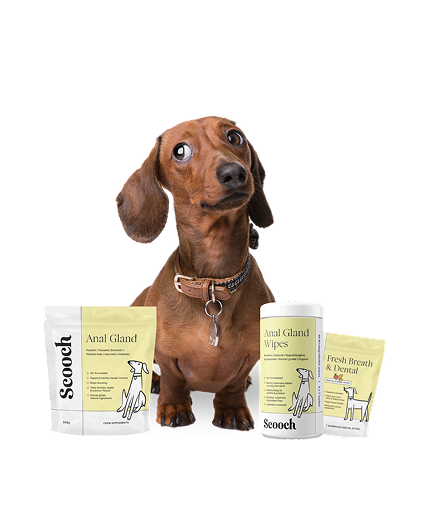
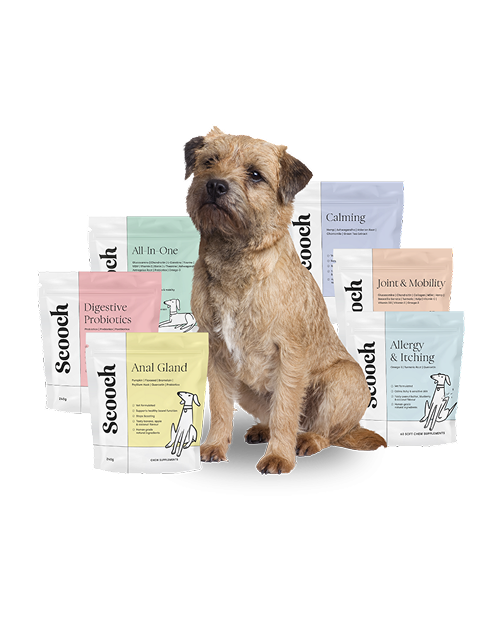
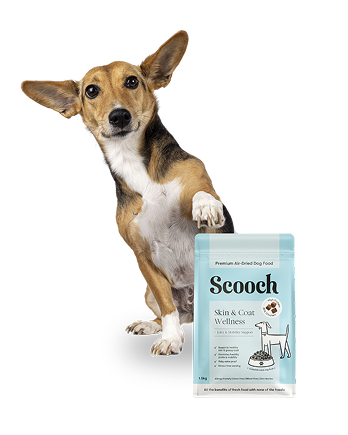
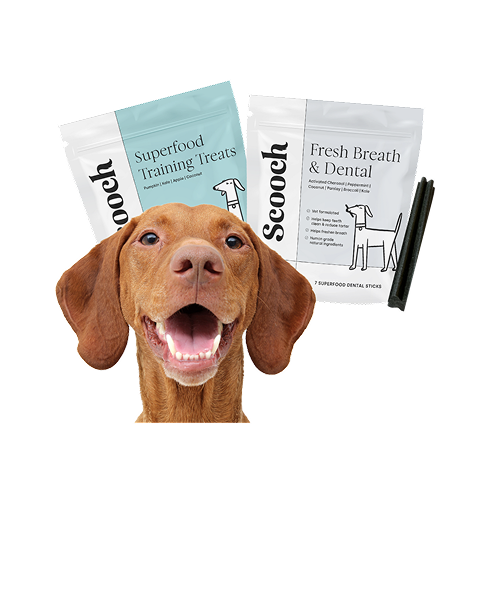
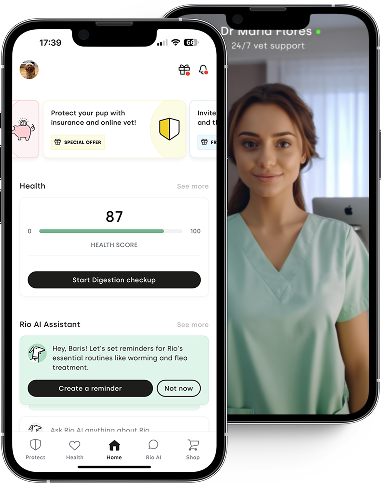 Scooch health
Scooch health